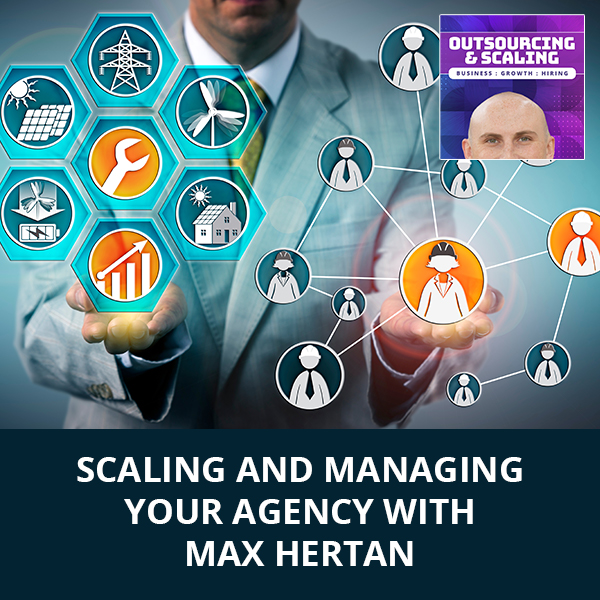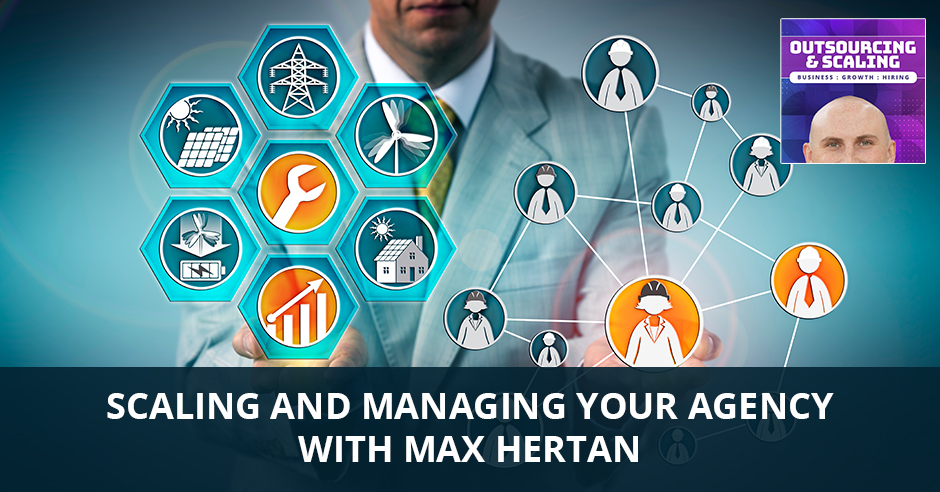


Being an entrepreneur and starting a business requires the drive to make it happen. As your business grows, you should know how to hire the right people and the right way to manage them. Max Hertan, the Founder of the award-winning seven-figure digital marketing agency called Megaphone, joins Nathan Hirsch in this episode to talk about hiring freelancers and scaling your agency. Starting from 3-star reviews to 5-star reviews, Max has built his company alongside his freelancers. Learn how he does it with his simple tips.
—
Listen to the podcast here:
[smart_track_player url=”https://www.podetize.com/statsapi/www.podetize.com/wp-content/uploads/fileuploads/11-5b145ef137b51b3d1af0633e9305c43d/11/2019/375a561c29615a681ea76702448d3eb3.mp3″ title=”Scaling And Managing Your Agency With Max Hertan” artist=”Nathan Hirsch” image=”https://freeup.net/wp-content/uploads/2019/04/OAS.png” ]
Download the audio file here.
Scaling And Managing Your Agency With Max Hertan
Our guest is Max Hertan. Max, how are you doing?
I’m good. I’m excited to be here.
I’m excited to interview you. We ran into each other in Croatia, Baby Bathwater and I introduced myself. I said, “I own FreeeUp.” You were like, “No way. I use FreeUp.” We got to talking. You’ve obviously grown a very successful marketing agency. For those of you that don’t know, Max built up an award-winning seven-figure digital marketing agency, Megaphone, and started investing in startups. He was always asking, “What do I get to learn and how do I get to learn new things as a grown-up adult?” He started a new YouTube channel, Max Hertan, where he tackles a new challenge every month from learning backflips, salsa dancing, skateboarding, meditation, bodybuilding and so much more. I’m excited to talk to you and we’re going to talk all about that scaling agency. I know you’re very hands-off in it hiring, building culture, but first, let’s take a gigantic step back. What were you like growing up as a kid? Were you a straight-A student? Were you a rebel? Did you always know you wanted to be an entrepreneur?
I wouldn’t say I was a straight-A student. I leaned more towards the rebel side of things. Growing up, I remember in primary school, friends had told me that I was the naughty kid. I was the perceived naughty kid and some kids weren’t even allowed to invite me to their party because I was destructive in class and very cheeky. The teachers love to hate me. In high school, it’s a similar story. I got a lot of detentions, but I got pretty good marks. I always could not have to work too much. I’d always try to think about what’s the most effective, efficient way that I can study the least amount so I could do the things that I wanted to do.
You live in Australia. I feel like in the US now, becoming an entrepreneur is almost becoming cool. Everyone wants to put it on their Instagram. It’s like the new big thing to do. Is it similar or does it look the same way in Australia?
I don’t think so. From my experiences, it’s like some people have that entrepreneurial gene. A lot of the entrepreneurs that I know in Australia are wheeling and dealing in primary school, high school and university. They’re always looking for opportunities and how can they solve problems. I wouldn’t say culturally it’s ingrained in Australia. It’s more those people that genetically seemed to have that drive to start a business.
Did you go to college? Did you graduate college?
Yes, I did university. I did a commerce economics degree. I majored in marketing as well. I found it honestly pretty useless and very low correlation to what I’m doing, even though it was a business and marketing degree.
Did you get a job out of college or did you go right into becoming an entrepreneur or starting your agency? Was there a business before that?

I was running a business in university putting uni-party listings because I liked to party. I listed every single party that was going on in every university around Australia. We build that up to a decent community on social media. We had Red Bull as a sponsor, which was pretty fun. It was not making a lot of money. After university, my story was I walked around the job fair, careers fair and speaking to all of these potential employers. I was looking at the people working at these companies and they don’t look satisfied. I took a year off and I started a band. For a year, I was a musician. I was playing guitar, I was writing songs. I was wearing red jeans. After that, I realized I do want to build a business. I do want to have money. I do want to do something useful for the world. That’s when I started a couple of businesses, one of them being Megaphone. That’s the one that I scaled and focused on.
What did that year one look like of getting that agency off the ground?
Originally, I partnered with someone that has a sales background. He was going to be the salesperson and I was going to be the nerd, the technical guy. A few weeks later, he decided that he wasn’t interested in this. He had a bigger project that he wanted to focus his time on. I take it now I’m going to have to learn everything. I’m going to learn business development and lead generation. My first client he introduced me to, which was a career expo. A place where you look to find your careers, funnily enough. The place that I didn’t like earlier. I spoke to every single exhibitor there. It was a two-day event and I would come in the morning and leave at 6:00 PM.
I would speak to every single exhibitor. I’m trying to get a potential lead, saying, “We did the marketing for this event. Maybe you’re interested in what we do.” I’ve got a few leads and finally got the second client. I didn’t know anything about lead generation, but I was learning a lot about Facebook marketing and Google advertising and starting to get very good at that. The service that I was offering the clients, they’re happy with, but I was struggling to get new clients. By the end of the year, I picked up five or six clients. I started to get a decent amount of reoccurring revenue. It was clear that this was a decent opportunity worth pursuing.
Who was your first hire with the agency?
I was a little bit too slow to hire. I was a classic thing of no one’s going to do it as good as me. I was apprehensive. I had sixteen or seventeen clients before I hired my first contractor. I hired a guy from a university job ad for three days a week. Instantly a lot of the workload that I was doing was alleviated so that I could help scale the business. I was like, “This is a no-brainer for the business.” Up to hiring one, it then came pretty clear that stuff is important to growing your business.
When the relationships within the company are strong, everyone wants to stay around longer.
What was that like as an agency? Because you’re doing everything, you build a relationship with the clients. All of a sudden, someone else is doing the work for that client. The client may or may not have any idea about that. How do you keep up that quality assurance, keep up that relationship, make sure the client is still taken care of and doesn’t feel like they got passed off and outsourced to someone else?
Honestly, that was the fear. I made it clear that I was still around for all of these clients as well. I didn’t hand every single one, but I handed off the ones that were the simplest campaigns and maybe the weakest relationships. I made sure that the person that I hired was good and that they were diligent. They were excited to be there. They had been well taught by me beforehand. When the client realized that there was another point of contact and that was now the primary point of contact, they were all pretty relaxed. It was a lot more in my head that they were not going to like it than it was the truth.
You’re growing this agency, you’re eventually able to take a step back. You said you spend very little time on the agency now. How many hours a week do you spend?
Over the last few years, I’ve slowly been winding down and grooming a CEO. I’ve got Lauren now in place as a CEO and she’s been awesome. I’ve got good ICs as well. I was doing four days a week and then I went down to three days a week. I was doing one day a week in the office. Right now, I’m doing one day a week in the office and then I’ll do bits and pieces outside of the office. I still want to scale the agency, but at the same time, the team that’s in place is doing a good job. Sometimes I’ll come in and they’d be like, “We’re on top of this. We’re already doing that.” I’d be like, “He did as much. The team is good.” That’s freed up my time to look at other ventures, make sure that I’m investing in my own personal growth. I’m constantly challenging myself and I can bring some of those ideas to the agency or in my life.
Walk us through that structure that allows you to work one day a week. How many people is it? You mentioned you have a CEO, you have two ICs. What’s an IC and what does that structure look like?
Our CEO is Lauren and she’s been with us for a few years. She was always very good and wanting to do more than what was recommended or what was needed and wanted additional training. It’s clear to me that she had the drive and the attitude that I look for someone that can run a business. She was also way more organized than me and good operationally. If you get someone to do something, there’s an Excel spreadsheet and she finds the right software. It’s clear that she had the personality to be running the business. Over the two years leading up to it, I started letting her shadow me. I started showing her different tasks and then slowly giving her a task. I’d oversee the task and then I’ll check in. A lot of the time I was blown away by how well she was doing a lot of these things.
The key thing is finding the right person, looking at what are the personality traits, attitudes and things that you’re going to need. With the two ICs, that’s the second-in-charge. That way, if she’s not around, who’s going to be running the business. There are lots of elements in running this business as well. You need them to be good strategically. You need to know all of the channels. You need to know how to sell. You need to know customer support. You need to have management skills. These are the things that I’ve slowly learned over time, whether it’s books, resources, mentors, and then sitting with these people. It’s making sure that they’re learning not just what to do in the situation, but why they do everything.

They have internalized the skills so that they’re adaptable to any situation. It’s being there if they need you, whether it’s Slack or a phone call. It’s making sure that they feel supported as well so that they can do what they need to do. If they do need that support, I’m always around as well. I’m trusting these people as well. A big thing is trusting them and letting go a little bit. They are going to make mistakes and not being upset for those mistakes because I made a million mistakes as well. Over time, they keep correcting themselves and getting better. In that transition, we were growing let’s say 100% a year and then we might have only grown 50% or 60%. I knew that there was going to be a little bit of a drop-off, but now we’re back to where we were. It was because of figuring out some of these things.
Talk to me about your worst hiring experience. Is there a story that stands out that people could learn from?
Yes. The one that comes to mind is we usually hire people focused on attitude. We focus on the personality and not necessarily the skillset. There was this one role that we needed to hire for. A lot of the team wanted someone highly skilled and just pay someone more. They’ve got the experience, they can jump into the role and do it well. I was not closed off to that, but I was weary that there had to be a culture fit and an attitude fit as the number one thing. They were more worried about the skillset. We hired someone that seemed to have the skillset, had ten years of sales experience and worked with a similar agency to us. The attitude was not aligned. As a result, some of the prospects and clients that this person had spoken to were offended by him. They actually left negative reviews. This guy had been only here for two weeks, and he’d got us three one-star reviews. Up until that point, we had 100% five-star reviews. We had 68 five-star reviews and we got three one-star reviews from people dealing with this guy. He had stolen information from his last company. These are series of little things that became huge red flags. It was going against my better judgment in some sense, but we all were curious to see how it’d go. It made it clear that skills are not everything. You need to look at the person, the cultural fit and things like that. Make sure they fit the essence of your team.
Anyone that follows our Facebook group or other things on the podcast know it’s all about the skill, the attitude and the communication. When you just focus on one, a lot of times you get burned. Talk to me about your culture. I know you said you like going to the office, you like having that office culture. Obviously, I’m more used to the remote lifestyle. What’s a culture that you’ve created?
We’re a team of just over twenty people. We’re all pretty young. We were all interested in self-improvement, fun and want to work at our own pace. Those are some of the things that we’ve ingrained into our culture. We want everyone to be good friends so that they liked working there and that they like to hang out with the people that they work with outside of work. I like this old school video game, Super Smash Bros. I love that game and it’s a beautiful game. From day one we’ve had Super Smash Bros. set up and we play it at 11:00 AM, 2:00 PM and 5:00 PM every day.
We’ll play for fifteen minutes. It’s similar to that Pomodoro methodology where you work in sprints and then you take these little breaks. We ingrained that into our day. Not everyone does that. A lot of people like to go for a walk. We’re near a park, so a lot of people just walk for a park and ate their lunch in the park or there’s a little basketball court there. We sometimes play some two and two and stuff like that for lunch. We also let people bring in dogs. Usually, there are three dogs in the office. The CEO got this little baby sausage dog that’s adorable, which is pretty awesome.
We also do team events. We do a monthly yoga, a monthly meditation. We’re doing a screening of The Bachelor. Whatever people are interested in, we’ve got a team or a few people dedicated to making sure that there are always fun events going on so people have a reason to connect, not just through work. When those relationships are strong, everyone wants to stay around in the company longer. They have more fun and they share more ideas. The last thing I’ll mention is we do something called Learn Day. This is something that I love and I think that a lot of businesses could do. Every month we pick five or six people and they have to learn something new.
Be resourceful with how you go about problem-solving; having mentors is a nice little shortcut to that.
They might read a blog post, read a book or do a video course. They want to present something new that we’re not doing in the company but that is relevant to what we’re doing. Everyone votes for the person that we think is the best and then they win a prize. Sometimes it’s a watch, an office chair, a standing desk or whatever they’re interested in. That way, we’re building innovation into our culture and we’re all constantly thinking of new ideas for our next Learn Day. A lot of these ideas have been implemented into new product services and things like that have made the business a lot of money too.
Let’s talk about the YouTube channel. You’re a pivoted agency owner. I know you invested in some other businesses too. Now you’re running a YouTube channel. You teach or you learn a new thing every month. Where did that idea come from and what’s it like behind the scenes of being “a YouTube star?”
Growing up, I’ve always loved learning new things and setting myself challenges. The idea wasn’t that far into me, but putting it on YouTube was quite foreign. I thought a lot of people might feel learning something new. Particularly when they’re older, they might go, “I want to learn Spanish, but it might take me years to learn and I don’t know where to start.” I thought, “Wouldn’t it be cool if every month a regular guy tries to learn something new and then you get to see his challenges along the way? He gets to speak to experts so that you can take that information and learn something yourself.” That was the idea. I thought it could be fun as well and connect me to some interesting experts so that I could learn more in my own life. I’m finishing my 24th challenge, which was learning Flight of the Bumblebee on piano, which is one of the hardest piano pieces out there, which was insane. Now I’m doing a digital minimalism challenge. That’s no Facebook, Instagram, YouTube, other than work. I’ve loved it. It’s been a fun journey.
What was your favorite challenge so far?
I’ve loved a lot of challenges. The ones that stand out for me is I did a bodybuilding one and I’d been going to the gym for a long time and getting up and down results. To focus for 90 days with a good trainer, I found satisfying because it’s something that I’ve struggled with previously. The other one that stands out for me is skateboarding, which is my most popular video. I tried skateboarding when I was twelve and I was terrible. I was tall, lanky, poorly coordinated. I gave up very quickly and I thought it wasn’t for me. To come back as an adult and try it again and learn how to ollie, kickflip and do these things that I didn’t necessarily think were in my scope of possibility was satisfying.
What advice do you have for other entrepreneurs out there? You’ve obviously done a lot, you’ve pivoted a few times, you have your hand in a lot of different things. What would you tell an entrepreneur that’s trying to figure out what they should be doing?
If they’re trying to figure out what they’re doing, probably the number one thing is reaching out to successful people that are 5 to 10 years ahead of where they might want to be. Offering to buy them lunch, coffee or whatever you can in terms of some form of value, in exchange for half an hour of their time or an hour of their time. Ask good questions and follow up with these people. At the start of my journey, I had five clients. I reached out to a person running an ad agency that was doing $100 million a year. He took the time to sit with me for an hour. He gave me as much advice as he could. A lot of these people will sit with you and have a chat, even though they’re very busy. They’re perceived to be very busy. A lot of the time they’ve already done all the heavy lifting and the thinking. You can fast forward and get some good answers. Be resourceful with how you go about problem-solving and mentors is such a nice little shortcut.
Where can people find out more about you and what are you most excited about for the rest of the year?
You can follow me at YouTube at Max Hertan or on Instagram @MaxHertan or you can check out our website, my agency, Megaphone Marketing. I’m going to Burning Man for the first time. 2019 for me is a little bit about exploring some more ideas to challenge the way that I’m doing in the world. I think Burning Man is a great event where it’s going to throw me into this unique experience. At the end of it, I’m sure I’ll have a lot to think about. It’s going to be fun. A lot of interesting ideas will come from it.
Thanks, Max.
Important Links:
- Megaphone
- Max Hertan – YouTube channel
- Pomodoro
- @MaxHertan – Instagram
About Max Herta
 Max Hertan built up an award-winning 7-figure digital marketing agency, Megaphone, and started investing in startups “Hey, what do I get to learn and how do I get to learn new things as a grown-up adult?”.
Max Hertan built up an award-winning 7-figure digital marketing agency, Megaphone, and started investing in startups “Hey, what do I get to learn and how do I get to learn new things as a grown-up adult?”.
